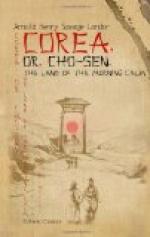The people of Cho-sen are fond of keeping late hours; and yet I believe there are no people in the world who are more fond of sleep. So far as my observations go, the richer people spend their lives entirely in eating and sleeping. Whenever I went to call on a Corean gentleman, I invariably found him either gorging or in the arms of Morpheus. Naturally a life of this sort makes the upper classes soft, and somewhat effeminate. They are much given to sensual pleasures, and many a man of Cho-sen is reduced to a perfect wreck when he ought to be in his prime. The habit of drinking more than is proper is really a national institution, and what with over feeding, drunkenness, and other vices it is not astounding that the upper ten do not show to great advantage. The Coreans are most irregular in their habits, for, slumbering as they do at all hours of the day, they often feel sleepless at night, and are compelled in consequence to sit up. On these occasions songs are roused, and dominoes (san-pi-yen), chess (chan-kin), or occasionally card games are started until another siesta is felt to be required. Cards, however, are seldom played by the upper classes; for they are considered a low amusement, only fit for coolies and soldiers. On grand occasions it is not unusual for the bon-vivant of Cho-sen to sit up all night, with his friends, feasting to such an extent that he and his guests are ill for months afterwards.
The Corean nobleman, as may well be imagined, suffers from chronic indigestion, and whenever one happens to inquire after his health the answer invariably is: “I have eaten something that has disagreed with me, I have a pain here.” And the hand is placed on the chest, in a mournful but expressive enough attitude.
The modes of illumination adopted in the Corean household are few and simple. The most common illuminant consists of grease candles, supported on high candlesticks, of wood or brass, but sometimes oil cup-lamps are found, like those we use for night-lights. The latter, however, do not give out much light, and so candles, which are marvellously cheap, are preferred, although unfortunately they melt quickly, and smoke and smell in a dreadful fashion.
Besides the various articles of domestic furniture which I have mentioned, I don’t think I saw any others worth noticing, except perhaps the “autograph” of some great man, to which the Coreans attach much importance. The paper, on which the “character” is written, is stretched on a wooden frame and hung in a prominent place, generally over the entrance, and whenever a new visitor enters the house, the first thing shown him is the “autograph,” and it is his duty then to compliment his host on his good fortune of possessing it.




